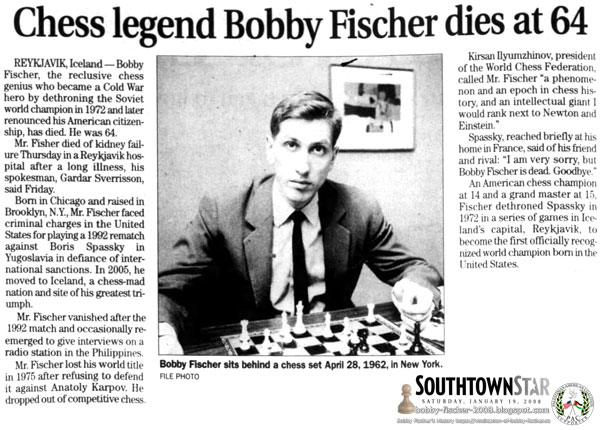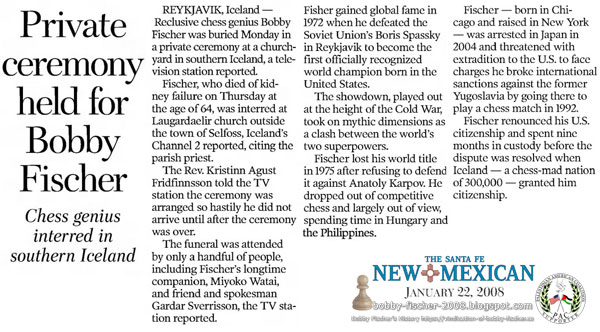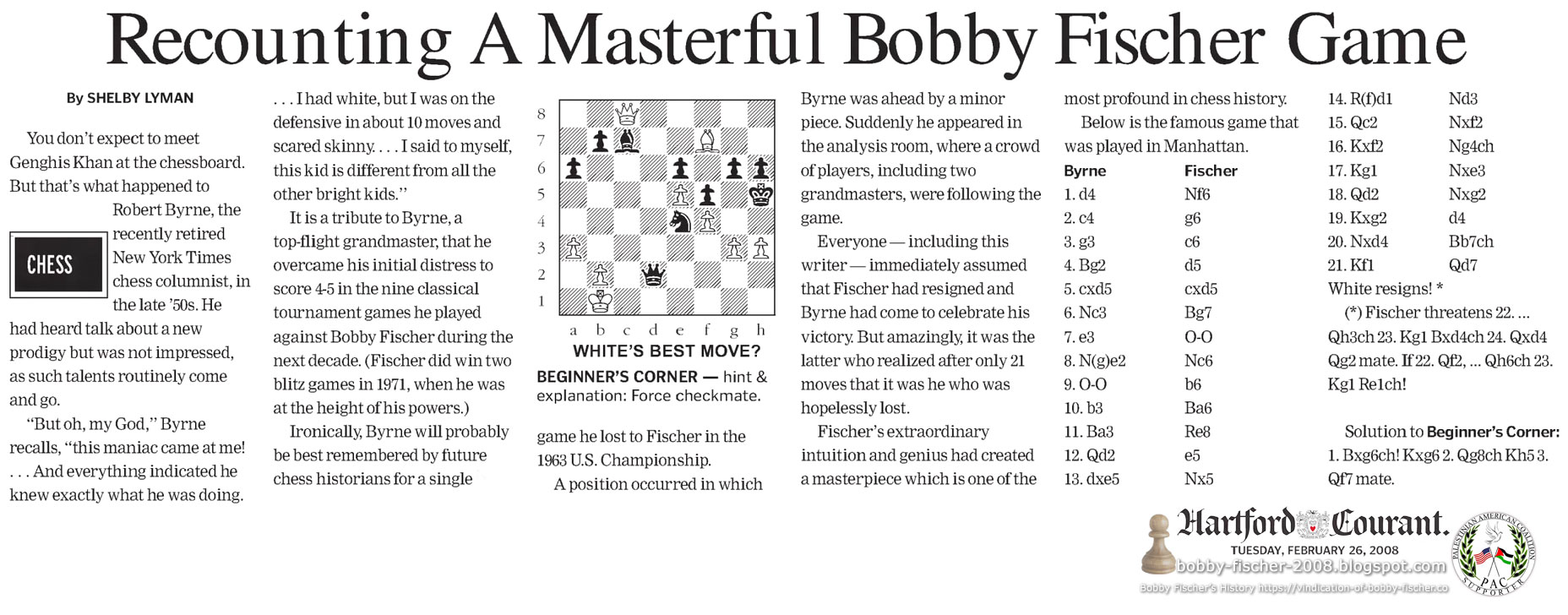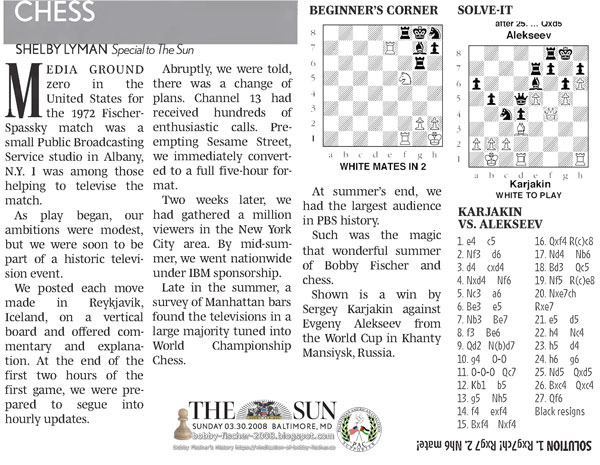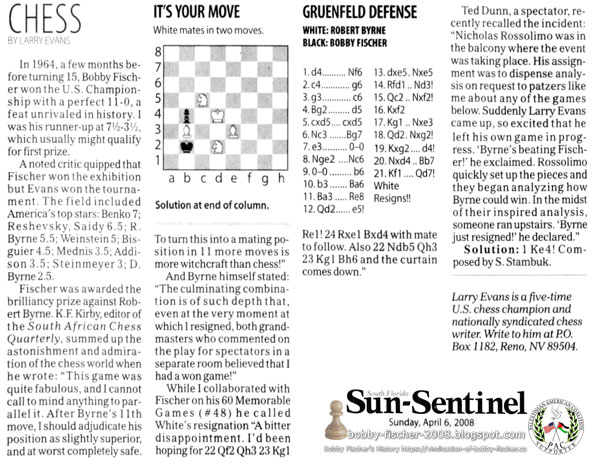Southtown Star Tinley Park, Illinois Saturday, January 19, 2008 - Page 4
Chess Legend Bobby Fischer Dies at 64
Reykjavik, Iceland—Bobby Fischer, the reclusive chess genius who became a Cold War hero by dethroning the Soviet world champion in 1972 and later renounced his American citizenship, has died. He was 64.
Mr. Fischer died of kidney failure Thursday after a long illness, his spokesman, Gardar Sverrisson, said Friday.
Born in Chicago and raised in Brooklyn, N.Y., Mr. Fischer faced criminal charges in the United States for playing a 1992 rematch against Boris Spassky in Yugoslavia in defiance of international sanctions. In 2005, he moved to Iceland, a chess-mad nation and site of his greatest triumph.
Mr. Fischer vanished after the 1992 match and occasionally re-emerged to give interviews on a radio station in the Philippines.
Mr. Fischer lost his world title in 1975 after refusing to defend it against Anatoly Karpov. He dropped out of competitive chess.
Kirsan Ilyumzhinov, president of the World Chess Federation, called Mr. Fischer “a phenomenon and an epoch in chess history, and an intellectual giant I would rank next to Newton and Einstein.”
Spassky, reached briefly at his home in France, said of his friend and rival: “I am very sorry, but Bobby Fischer is dead. Goodbye.”
An American chess champion at 14 and a grand master at 15, Fischer dethroned Spassky in 1972 in a series of games in Iceland's capital, Reykjavik, to become the first officially recognized world champion born in the United States.
The Santa Fe New Mexican, Santa Fe, New Mexico, Tuesday, January 22, 2008 - Page A002
Private ceremony held for Bobby Fischer
Chess genius interred in southern Iceland
Reykjavik, Iceland—Reclusive chess genius Bobby Fischer was buried Monday in a private ceremony at a churchyard in southern Iceland, a television station reported.
Fischer, who died of kidney failure on Thursday at the age of 64, was interred at Laugardaelir church outside the town of Selfoss, Iceland's Channel 2 reported, citing the parish priest.
The Rev. Kristinn Agust Fridfinnsson told the TV station there ceremony was arranged so hastily he did not arrive until after the ceremony was over.
The funeral was attended by only a handful of people, including Fischer's longtime companion, Miyoko Watai, and friend and spokesman Gardar Sverrisson, the TV station reported.
Sverrisson did not return a call seeking comment late Monday.
Fischer gained global fame in 1972 when he defeated the Soviet Union's Boris Spassky in Reykjavik to become the first officially recognized world champion born in the United States.
The showdown, played out at the height of the Cold War, took on mythic dimensions as a clash between the world's two superpowers.
Fischer lost his world title in 1975 after refusing to defend it against Anatoly Karpov. He dropped out of competitive chess and largely out of view, spending time in Hungary and the Philippines.
Fischer — born in Chicago and raised in New York — was arrested in Japan in 2004 and threatened with extradition to the U.S. to face charges he broke international sanctions against the former Yugoslavia by going there to play a chess match in 1992.
Fischer renounced his U.S. citizenship and spent nine months in custody before the dispute was resolved when Iceland—a chess-mad nation of 300,000—granted him citizenship.
Hartford Courant Hartford, Connecticut Tuesday, February 26, 2008 - Page D05
Recounting A Masterful Bobby Fischer Game
You don't expect to meet Genghis Khan at the chessboard. But that's what happened to Robert Byrne, the recently retired New York Times chess columnist, in the late '50's. He had heard talk about a new prodigy but was not impressed, as such talents routinely come and go.
“But oh, my God,” Byrne recalls, “this maniac came at me! …And everything indicated he knew exactly what he was doing. …I had white, but I was on the defensive in about 10 moves and scared skinny…I said to myself, this kid is different from all the other bright kids.”
It is a tribute to Byrne, a top-flight grandmaster, that he overcame his initial distress to score 4-5 in the nine classical tournament games he played against Bobby Fischer during the next decade. (Fischer did win two blitz games in 1971, when he was at the height of his powers.)
Ironically, Byrne will probably be best remembered by future chess historians for a single game he lost to Fischer in the 1963 U.S. Championship.
A position occurred in which Byrne was ahead by a minor piece. Suddenly he appeared in the analysis room, where a crowd of players, including two grandmasters, were following the game.
Everyone—including this writer—immediately assumed that Fischer had resigned and Byrne had come to celebrate his victory. But amazingly, it was the latter who realized after only 21 moves that it was he who was hopelessly lost.
Fischer's extraordinary intuition and genius had created a masterpiece which is one of the most profound in chess history.
Below is the famous game that was played in Manhattan.
The Baltimore Sun Baltimore, Maryland Sunday, March 30, 2008 - Page E13
Chess.
MEDIA GROUND zero in the United States for the 1972 Fischer-Spassky match was a small Public Broadcasting Service studio in Albany, N.Y. I was among those helping to televise the match.
As play began, our ambitions were modest, but we were soon to be part of a historical television event.
We posted each move made in Reykjavik, Iceland, on a vertical board and offered commentary and explanation. At the end of the first two hours of the first game, we were prepared to segue into hourly updates.
Abruptly, we were told, there was a change of plans. Channel 13 had received hundreds of enthusiastic calls. Pre-empting Sesame Street, we immediately converted to a full five-hour format.
Two weeks later, we had gathered a million viewers in the New York City area. By mid-summer, we went nationwide under IBM sponsorship.
Late in the summer, a survey of Manhattan bars found the televisions in a large majority tuned into World Championship Chess.
At summer's end, we had the largest audience in PBS history.
Such was the magic that wonderful summer of Bobby Fischer and chess.
South Florida Sun Sentinel Fort Lauderdale, Florida Sunday, April 06, 2008 - Page 94
Chess by Larry Evans
In 1964, a few months before turning 15, Bobby Fischer won the U.S. Championship with a perfect 11-0, a fear unrivaled in history. I was his runner-up at 7½-3½, which usually might qualify for first prize.
A noted critic quipped that Fischer won the exhibition but Evans won the tournament. The field included America's top stars: Benko 7; Reshevsky, Saidy 6.5; R. Byrne 5.5; Weinstein 5; Bisguier 4.5; Mednis 3.5; Addison 3.5; Steinmeyer 3; D. Byrne 2.5.
Fischer was awarded the brilliancy prize against Robert Byrne. K.F. Kirby, editor of South African Chess Quarterly, summed up the astonishment and admiration of the chess world when he wrote: “This game was quite fabulous, and I cannot call to mind anything to parallel it. After Byrne's 11th move, I should adjudicate his position as slightly superior, and at worst completely safe.
To turn this into a mating position in 11 more moves is more witchcraft than chess!”
And Byrne himself stated: “The culminating combination is of such depth that, even at the very moment at which I resigned, both grandmasters who commented on the play for spectators in a separate room believed that I had a won game!”
While I collaborated with Fischer on his 60 Memorable Games (#48) he called White's resignation “A bitter disappointment. I'd been hoping for 22 Qf2 Qh3 23 Kg1 Re1! 24 Rxe1 Bxd4 with mate to follow. Also 22 Ndb5 Qh3 23 Kg1 Bh5 and the curtain comes down.”
Ted Dunn, a spectator, recently recalled the incident: “Nicholas Rossolimo was in the balcony where the event was taking place. His assignment was to dispense analysis on request to patzers like me about any of the games below. Suddenly Larry Evans came up, so excited that he left his own game in progress. ‘Byrne's beating Fischer!’ he exclaimed. Rossolimo quickly set up the pieces and they began analyzing how Byrne could win. In the midst of their inspired analysis, someone ran upstairs. ‘Byrne just resigned!’ he declared.”











